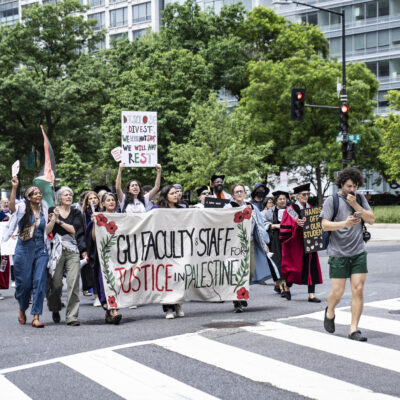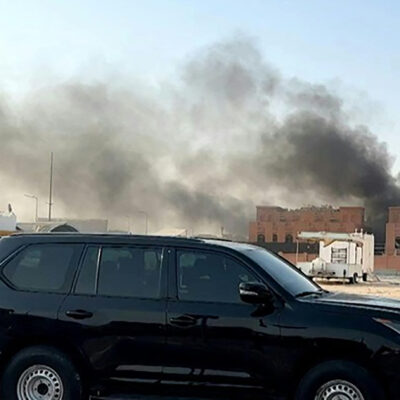
Win McNamee/Getty Images
Trump’s Gulf tour underscores Israel’s diplomatic disadvantage
The message in Trump’s keynote speech and the optics of a Mideast visit that doesn’t include Israel were met with concern by pro-Israel Republicans and hawkish foreign policy experts
When President Donald Trump arrived in Saudi Arabia on Monday, Air Force One descended into Riyadh with a Saudi F-15 escort. It was the first of many such deferential gestures from Saudi Crown Prince Mohammed bin Salman, who rolled out the figurative red carpet for the American president. (The actual carpet greeting Trump as he exited the plane was lavender.)
The glitzy warm welcome set the stage for a trip that has already been dominated by deals and investment opportunities. If there was any doubt about Trump’s increasing reliance on checkbook diplomacy, and his disapproval of America’s past approach to the Middle East, he left little room for dispute in a keynote address on Tuesday that sharply critiqued “interventionalists” and “neo-cons” while calling for an end to regional wars.
“The gleaming marvels of Riyadh and Abu Dhabi were not created by the so-called nation-builders, neo-cons or liberal nonprofits like those who spent trillions failing to develop [Kabul], Baghdad, so many other cities,” Trump said in a speech at a U.S.-Saudi investment event.
The message in Trump’s Tuesday speech, and the optics of a visit to the Middle East that doesn’t include a stop in Israel, were met with concern by pro-Israel Republicans and hawkish foreign policy experts, who worry that his turbo-charged dealmaking with oil-rich Gulf nations — cemented this week with trade deals in the hundreds of billions of dollars — puts Israel at a diplomatic disadvantage.
“His approach is obviously completely transactional. If he has a view about U.S. national interest, that view revolves around financial and commercial interests, and that diminishes the value of the alliance with Israel, which is not primarily financial and commercial,” said Elliott Abrams, a former longtime Republican official who served as Iran envoy in Trump’s first term. “It’s based on values. It’s based on military cooperation.”
Trump has taken several steps in recent days that at least create the appearance of distance between Washington and Jerusalem. With the encouragement of Saudi Arabia, which has sought to deescalate tensions in the region — including with the Houthis and in Syria — as a means to furthering economic stability, the president announced that the U.S. would cease its campaign against the Houthis in exchange for the Yemeni rebels to stop its attacks on global shipping. The Iran-backed group has continued to fire on Israel in the days since the ceasefire went into effect. Israeli Prime Minister Benjamin Netanyahu reportedly was not part of American negotiations with Hamas to release American-Israeli hostage Edan Alexander — although he attempted to push back on this narrative with a post on X saying Alexander would not have been freed without Israel’s recent military activity in Gaza.
While those issues will almost certainly come up in Trump’s stops in Saudi Arabia, the United Arab Emirates and Qatar, intensive discussions about security concerns are expected to be secondary to the investments Trump is eager to announce from Gulf sovereign wealth funds.
Financially, “Israel can’t compete with these other states,” said David Schenker, who headed the State Department’s Bureau of Near Eastern Affairs in the first Trump administration. “I think there’s a growing frustration in the administration about the intransigence on Gaza. You see that with the administration pushing its own humanitarian initiative now. And, frankly, the president has a real desire to expand the Abraham Accords.”
“This current trip is about doing serious business, about solidifying [Trump’s] relationship with the countries that he’s visiting. Israel is not, apparently, part of that conversation right now,” said Shalom Lipner, a former advisor to Netanyahu and other Israeli prime ministers. “Certainly one of the challenges of the month moving forward for the Israeli government will be to find a way to inject itself into that conversation in a constructive way for the State of Israel.”
Financially, “Israel can’t compete with these other states,” said David Schenker, who headed the State Department’s Bureau of Near Eastern Affairs in the first Trump administration. Rather than financial investments, he said, Israel could make concessions to what Trump wants to see in the region. If it doesn’t adapt, Israel could run the risk of being sidelined in Washington.
“I think there’s a growing frustration in the administration about the intransigence on Gaza. You see that with the administration pushing its own humanitarian initiative now. And, frankly, the president has a real desire to expand the Abraham Accords,” Schenker noted. “On the [Israeli] policy toward Gaza, the absence of any strategic approach to Gaza or ideas about the day after are an impediment toward achieving that normalization. If you want to talk transactionalism, this is something that the Israelis could do.” Trump said in his speech Tuesday that he wants to see the Gaza war “ended as quickly as possible,” a seemingly contradictory policy to Netanyahu’s plans to expand operations in Gaza.
“I am not alarmed by this,” Jonathan Schanzer, executive director of the Foundation for Defense of Democracies, said. “Beginning to engage again with the Saudis is potentially a step toward normalization. It’s beginning to reestablish good relations with the Saudis after a very frigid four years under [former President Joe] Biden.”
Trump also made clear in his speech that he is still interested in mediating a normalization agreement between Saudi Arabia and Israel, even as he announced new arms sales to Riyadh and heightened defense cooperation that many expected to be connected to a normalization deal.
Jonathan Schanzer, executive director of the Foundation for Defense of Democracies, said he does not see Trump’s visit to Saudi Arabia and interest in economic deals with Gulf states as detrimental to Israel.
“I am not alarmed by this,” he said. “Beginning to engage again with the Saudis is potentially a step toward normalization. It’s beginning to reestablish good relations with the Saudis after a very frigid four years under [former President Joe] Biden.”
Trump’s speech in Riyadh was cheered by Under Secretary of Defense Elbridge Colby, one of the most prominent isolationist voices in his administration.
“I still fundamentally see that the base of the Republican Party is pro-Israel. He’s got evangelicals, he’s got Congress,” said Michael Makovsky, CEO and president of the Jewish Institute for National Security of America.
But whether those people are getting through to Trump is a different question.
“It’s very hard to make arguments to Trump, but perhaps they can make arguments to people around him, people he listens to, including in Congress, about the harm to the United States from appearing to ignore the interests of allies,” said Abrams. “But that hasn’t stopped him with respect to Europe. So I don’t know how valuable that tack would be.”






